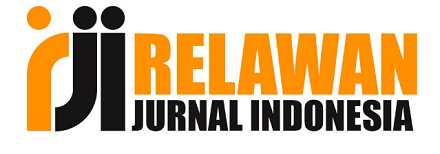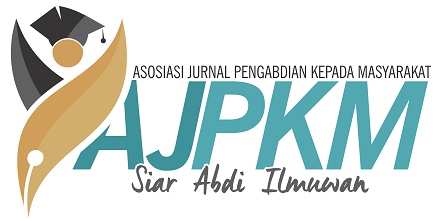Meningkatkan literasi keuangan digital pada pelaku UMKM melalui sosialisasi gerakan nasional non-tunai
DOI:
https://doi.org/10.33474/jipemas.v4i3.10947Keywords:
cashless transactions, financial literacy, MSMEsAbstract
The Covid-19 pandemic is a milestone for the Gerakan Nasional Non-Tunai (GNNT) in Indonesia. This GNNT socialization activity to Micro, Small, and Medium Enterprises (MSMEs) aimed to support the Indonesia Payment System Blueprint (BSPI) 2025. MSMEs are the largest business (98.67%) which contributes 60.34% to Gross Domestic Product (GDP) in Indonesia. The socialization, MSME actors can make transactions with the electronic leisure payment system. Electronic payments as a result of buying and selling transactions electronically through the internet (e-commerce). The method of implementing this activity is to conduct socialization and Forum Group Discussions (FGD) face-to-face under health protocol standards during the Covid-19 pandemic. In addition to socialization, e.g. of the application of using electronic money through smartphones was also given. The enthusiasm of the participants was shown during the discussion session. They feel that they understand more about the benefits of the electronic payment system in the GNNT policy and will apply it to their productive economic business activities. After receiving the socialization, we have recorded that three of the eight micro-business actors participating in the socialization applied the non-cash transactions. Warung Kamu had applied the payment using the Quick Response Code Indonesia Standard (QRIS). The Olahan Bandeng and Ida Collection market their products through the Kopimi E-Gerai.References
Aggarwal, K., Malik, S., Mishra, D. K., & Paul, D. (2021). Moving from Cash to Cashless Economy : Toward Digital India. 8(4), 43–54. https://doi.org/10.13106/jafeb.2021.vol8.no4.0043
Alika, R. (2020). Literasi Keuangan Digital Rendah, Jokowi Minta Fintech Perluas Peran. Katadata.Co.Id.
Bire, A. R., Sauw, H. M., & Maria, -. (2019). The effect of financial literacy towards financial inclusion through financial training. International Journal of Social Sciences and Humanities, 3(1), 186–192. https://doi.org/10.29332/ijssh.v3n1.280
Bruno, P., Denecker, O., Nierderkorn, M., Dikshit, P., Lundberg, T., Botta, A., Höll, R., Jain, R., Shah, N., Tan, L. H., Lushinsky, Y., Murati, A., Zell, J., Albonico, M., Digiacomo, N., Farroni, A., & Nagy, T. (2020). Global Banking Practice: The 2020 McKinsey Global Payments Report. October, 1–38. https://www.mckinsey.com/~/media/mckinsey/industries/financial services/our insights/accelerating winds of change in global payments/2020-mckinsey-global-payments-report-vf.pdf
CIPS Indonesia. (2020). Siaran Pers | Digitalisasi, Solusi UMKM Bertahan Selama Pandemi. Centre for Indonesian Policy Studies.
Davis, F. D. (1989). Perceived usefulness, perceived ease of use, and user acceptance of information technology. MIS Quarterly: Management Information Systems, 13(3), 319–339. https://doi.org/10.2307/249008
Djamaluddin, S., Hidayanto, A. N., & Wardhani, S. (2016). Perception of beneficiaries towards adoption of e-money in the distribution of social assistance in Indonesia. Economic Journal of Emerging Markets, 8(1), 13–24. https://doi.org/10.20885/ejem.vol8.iss1.art2
Ewa Abbas, A. (2017). Literature Review of a Cashless Society in Indonesia: Evaluating the Progress. International Journal of Innovation, Management and Technology, 8(3), 193–196. https://doi.org/10.18178/ijimt.2017.8.3.727
Fatmasari, D., Waridin, Kurnia, A. S., & Amin, R. (2019). Use of E-Money and Debit Cards in Student Consumption Behavior. E3S Web of Conferences, 125(201 9), 1–4. https://doi.org/10.1051/e3sconf/201912503013
Fauziah, N., & Nurhasanah, N. (2020). the Effect of the Perception of Electronic Money on Consumptive Behavior of Stei Sebi Students. Jurnal Ekonomi Dan Perbankan Syariah, 8(1), 63–84. https://doi.org/10.46899/jeps.v8i1.176
Fitriana, A., & Wingdes, I. (2017). Analisis TAM Terhadap Faktor-Faktor yang Mempengaruhi Konsumen Menggunakan e-Money Indomaret Card di Pontianak. Techno.Com, 16(4), 401–410. https://doi.org/10.33633/tc.v16i4.1515
Gunawan, H., Sinaga, B. L., & Sigit Purnomo, W. P. (2019). Assessment of the readiness of micro, small and medium enterprises in using E-money using the unified theory of acceptance and use of technology (UTAUT) method. Procedia Computer Science, 161, 316–323. https://doi.org/10.1016/j.procs.2019.11.129
Gusti, G. P. (2020). Is There Any Impact of Electronic Money To Increase Knowledge of Financial Literacy?: in the Pandemic Situation of Covid-19 in Pontianak City. Malaysian E Commerce Journal, 4(2), 48–53. https://doi.org/10.26480/mecj.02.2020.48.53
Legris, P., Ingham, J., & Collerette, P. (2003). Why do people use information technology? A critical review of the technology acceptance model. Information and Management, 40(3), 191–204. https://doi.org/10.1016/S0378-7206(01)00143-4
Ridhoi, M. A. (2020). Rendahnya Akses Perbankan Bisa Ganjal Digitalisasi Ekonomi - Analisis Data Katadata. Katadata.Co.Id.
Rogers, E. M. (1962). Diffusion of innovations (3th ed.). A Division of Macmillan Publishing Co., Inc. https://doi.org/10.4324/9780203710753-35
Saragih, S. P. (2019). Technology Acceptance of Digital Payment System Pada Pelaku Umkm Di Kota Batam. Computer Based Information System Journal, 7(2), 82. https://doi.org/10.33884/cbis.v7i2.1402
Syahadiyanti, L., & Subriadi, A. P. (2018). International Journal of Economics and Financial Issues Diffusion of Innovation Theory Utilization Online Financial Transaction: Literature Review. International Journal of Economics and Financial Issues, 8(3), 219–226. http:www.econjournals.com
Wonglimpiyarat, J. (2016). S-curve trajectories of electronic money innovations. Journal of High Technology Management Research, 27(1), 1–9. https://doi.org/10.1016/j.hitech.2016.04.001
Xena, P., & Rahadi, R. A. (2019). Adoption of E-Payment To Support Small Medium Enterprise Payment System: a Conceptualised Model. International Journal of Accounting, 4(18), 32–41. www.ijafb.com
Downloads
Published
How to Cite
Issue
Section
License
.









